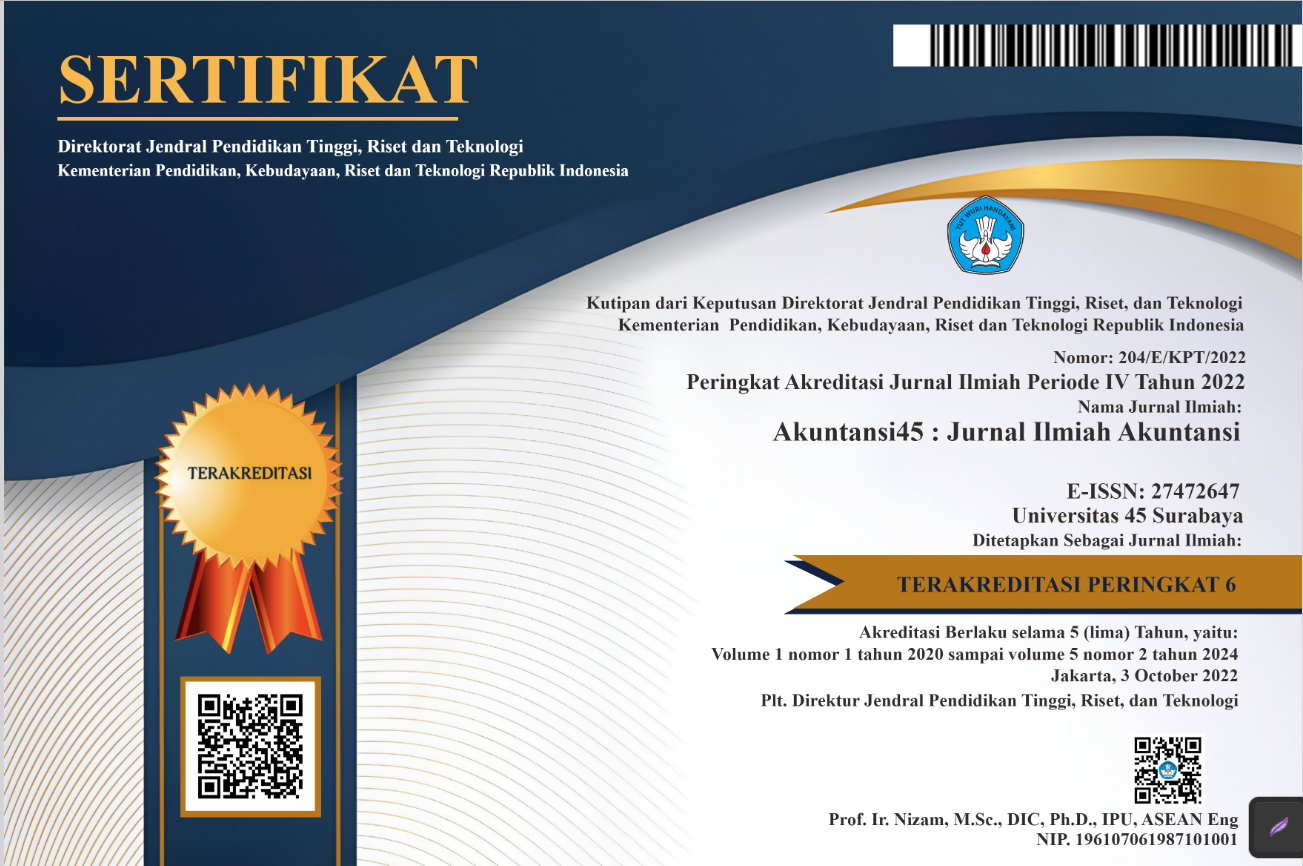Perilaku Keuangan Generasi Milenial: Memahami Pola Pengambilan Keputusan Keuangan pada Generasi Digital
DOI:
https://doi.org/10.30640/akuntansi45.v6i1.4209Keywords:
Financial Behavior, Millennial Generation, Financial Decision Making and Digital GenerationAbstract
The millennial generation, born between 1980 and 2000, is currently the focus of attention in various aspects of life, including in terms of financial behavior. This study aims to analyze the financial behavior of the millennial generation and identify factors that affect the financial behavior of the millennial generation, such as financial literacy, lifestyle, technology and social media, and the social environment. This study uses a qualitative approach with a survey method. Data was obtained through interviews with millennial generation respondents. The millennial generation tends to be more comfortable using digital platforms to manage their finances, including mobile banking and investment applications. The millennial generation has a tendency to prioritize experiences and lifestyles over the accumulation of traditional assets. Those who have higher education and stable jobs tend to exhibit more planned and long-term oriented financial behavior. One of the main findings is the significant influence of digital technology on the financial behavior of the millennial generation. Financial influencers on social media have a significant influence on the investment decisions of the millennial generation. This can explain some patterns of financial behavior that seem irrational from a traditional economic perspective.
References
Abu-Bader, S., & Jones, T. V. (2021). Statistical mediation analysis using the Sobel test and Hayes SPSS Process Macro. International Journal of Quantitative and Qualitative Research Methods, 9(1), 42–61.
Achmad Daengs, G. S., Istanti, E., Bramastyo Kusuma Negoro, R. M., & Sanusi, R. (2020). The aftermath of management actions on competitive advantage through process attributes at food and beverage industries export import in Perak Harbor of Surabaya. International Journal of Criminology and Sociology, 9, 1418–1425. https://doi.org/10.6000/1929-4409.2020.09.162
Andiani, D. A. P., & Maria, R. (2023). Pengaruh financial technology dan literasi keuangan terhadap perilaku keuangan pada Generasi Z. Jurnal Akuntansi Bisnis dan Ekonomi, 9(2), 3468–3475. https://doi.org/10.33197/jabe.vol9.iss2.2023.1226
Annisa, P. (2016). Pengaruh komunikasi, budaya organisasi dan komitmen organisasi terhadap kinerja karyawan pada PT. Hero Supermarket Tbk. Cabang Giant Waru Sidoarjo [Skripsi, Universitas Bhayangkara].
Aprilistya, A., Azhari, C. V., & Pramesti, C. A. (2023). Dampak media sosial terhadap penurunan nilai moral dan etika generasi muda. Journal of Economics, Business, Management, Accounting and Social Sciences (JEBMASS), 1(4), 165–168. https://ojs.putrajawa.co.id/index.php/jebmass/article/view/80/33
Brown, A., & Smith, B. (2021). Flexible insurance models for the millennial generation. Journal of Risk and Insurance, 88(4), 623–640.
Brown, A., & Smith, B. (2023). The millennial financial literacy paradox: High knowledge, low application. Journal of Financial Education, 49(2), 178–195.
Chen, L., Wang, X., & Thompson, J. (2022). Financial literacy among millennials: A comparative study. International Journal of Consumer Studies, 46(4), 891–907.
Daengs, G. S. A., Istanti, E., Negoro, R. M. B. K., & Sanusi, R. (2020). The aftermath of management action on competitive advantage through process attributes at food and beverage industries export import in Perak Harbor of Surabaya. International Journal of Criminology and Sociology, 9, 1418–1425.
Enny, I., Bramastyo, K., & I. N. (2020). Implementasi harga, kualitas pelayanan dan pembelian berulang pada penjualan produk gamis Afifathin. Ekonomika 45, 8(1), 1–10.
Findri, F. (2021). Pengaruh fintech terhadap minat generasi milenial dalam berinvestasi di pasar modal. Supremasi Hukum, 17(2), 96–103.
Fitriyani, A., Rosadi, A. D., Laila, F., Puspita, D., & Imron, A. (2024). Generasi Z mempengaruhi keputusan dalam pemilihan umum tahun 2024. Journal of Education Science (JES), 10(1), 14–24.
Garcia, M., Rodriguez, N., & Thompson, K. (2023). The gig economy and millennial financial behavior. Journal of Labor Economics, 41(2), 345–362.
Ida, I., Zaniarti, S., & Wijaya, G. E. (2020). Financial literacy, money attitude, dan financial management behavior generasi milenial. Jurnal Muara Ilmu Ekonomi dan Bisnis, 4(2), 406. https://doi.org/10.24912/jmieb.v4i2.9144
Iskandarsyah, A., & Setyowibowo, H. (2020). Sikap terhadap pensiun, perencanaan pensiun, dan kualitas hidup pada karyawan dalam masa persiapan pensiun. Journal of Psychological Science and Profession, 4(1), 23. https://doi.org/10.24198/jpsp.v4i1.25106
Kristiawati, et al. (2019). Citra merek persepsi harga dan nilai pelanggan terhadap keputusan pembelian pada mini market Indomaret Lontar Surabaya. Jurnal Ilmu Ekonomi dan Manajemen (JMM 17), 6(2), 27–36.
Kumala Dewi, I., et al. (2022). Peningkatan kinerja UMKM melalui pengelolaan keuangan. Jurnal Ekonomi Akuntansi, UNTAG Surabaya, 23–36.
Pramono, B., Istanti, E., Daengs, G. S., Achmad, S., & Bramastyo, K. N. R. M. (2023). Impact of social media marketing and brand awareness on purchase intention in coffee shop culinary in Surabaya. International Journal of Entrepreneurship and Business Development, 5(6), 968–977.
Prasadio, A. T., & Widyastuti, U. (2020). Pengaruh lingkungan sosial terhadap perilaku keuangan generasi milenial. Jurnal Manajemen dan Kewirausahaan, 22(1), 45–54.
Prasetyo, A., & Hartoyo, H. (2021). Analisis literasi keuangan generasi milenial di Indonesia. Jurnal Keuangan dan Perbankan, 25(2), 123–145.
Pratama, D. Y., Kusumawardhani, R., & Maulida, A. (2024). Pengaruh literasi keuangan, sikap keuangan dan gaya hidup pada perilaku keuangan generasi milenial. JPEK (Jurnal Pendidikan Ekonomi dan Kewirausahaan), 8(1), 126–132. https://doi.org/10.29408/jpek.v8i1.24223
Pratiwi, F. M., & Puspawati, D. (2022). Factors influencing millennial generation investment decisions: Focus on investment behaviour. Procedia of Social Sciences and Humanities, 3(c), 19–27. https://doi.org/10.21070/pssh.v3i.198
Putri, N., Nurwati, S., & Mahrita, A. (2023). Pengaruh literasi keuangan, gaya hidup hedonisme, dan sikap keuangan terhadap perilaku pengelolaan keuangan pribadi wanita bekerja di Kota Palangka Raya. Jurnal Studi Manajemen dan Bisnis, 10(1), 86–95. https://doi.org/10.21107/jsmb.v10i1.20485
Rahardjo, W., & Mulyono, B. H. (2021). Peran teknologi dan media sosial dalam pengambilan keputusan keuangan generasi milenial. Jurnal Manajemen dan Kewirausahaan, 23(1), 67–78.
Rajagukguk, R. J., & Susanti, E. (2024). Peranan sosial media dalam mengedukasi generasi muda mengenai literasi keuangan untuk membangun kebiasaan menabung. Ideas: Jurnal Pendidikan, Sosial, dan Budaya, 10(2), 415. https://doi.org/10.32884/ideas.v10i2.1717
Rina Dewi, et al. (2020). Internal factor effects in forming the success of small businesses. Jurnal SINERGI UNITOMO, 10(1), 13–21.
Riyadi, S., & Widiyanto, W. (2021). Analisis perilaku keuangan generasi milenial. Jurnal Ekonomi dan Bisnis, 24(2), 201–218.
Rudiwantoro, A. (2018). Langkah penting generasi millennial menuju kebebasan finansial melalui investasi. Jurnal Moneter, 5(1), 44–51.
Salim Gazali, et al. (2024). Ikan Nomei, Merdeka Belajar Kampus Merdeka, 1–98.
Sari, D. A., & Lestari, S. (2020). Pengaruh gaya hidup terhadap perilaku keuangan generasi milenial. Jurnal Ilmu Manajemen, 18(1), 55–68.
Downloads
Published
How to Cite
Issue
Section
License
Copyright (c) 2025 AKUNTANSI 45

This work is licensed under a Creative Commons Attribution-ShareAlike 4.0 International License.









